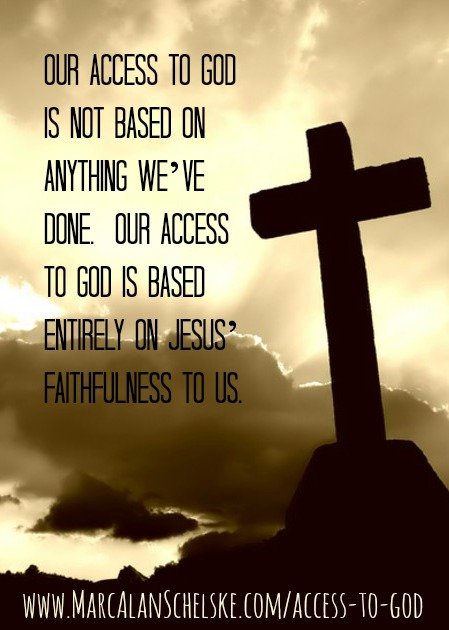5 min. to read.
Want God to answer your prayers? Want a sense of intimacy with God? Then you have to show you’re serious in your commitment. You need to be doing all the right things and avoiding all the wrong ones. Try harder, believe more, really mean it this time.
Not everyone believes this, but a lot of people do. Do you? I certainly believed this for a long time.
It’s not hard to see why this kind of belief is so common. In our experience access is earned or paid for.
- Want to publish a book? You have to have a platform with lots of social media followers.
- Want to build a platform? You have to provide great content that people find meaningful.
- Want to get a promotion? You have to perform well and build good relationships with management.
- Want a FastPass at Disney so you don’t have to wait in lines? You have to pay for it.
If you want access, there’s always something more you have to do. Right?
No more temples, priests or sacrifices!

Across time we’ve created religions to help us connect to God. Most of these religions have temples, priests and sacrifices. A temple is a sacred place you can go to connect with God. A priest is a sacred person who can give you access to God. A Sacrifice is the price you pay for access. They may go by other names, but the principle is the same.
Christianity is not like this. (Some Christian communities have fallen back into these religious habits, but without even realizing it they are undermining the message of Jesus!)
In Ephesians 3:12 Paul promises us access to God. ”In Him we have boldness and confident access through faith in Him.”
Paul says this access comes to us “in Christ.” We don’t need a certain special place to go where we can find God. Why? Because Jesus is the temple, and we are in Christ. We don’t need a certain special person who can give access to God. Why? Because Jesus is our High Priest, and we are in Christ. We don’t need a sacrifice, a certain special religious ritual to get God’s attention or pay for our sins. Why? Because Jesus made the final sacrifice once and for all.
Jesus gives us full access to God.
So just believe really hard in Jesus, right?
This is a pretty powerful message. But there’s a dark side to it. It’s not uncommon for people in the middle of really hard or painful circumstances to have well-meaning friends say, “Just have more faith. Just believe.”
That sounds right. The problem is that there are days when no matter how much you want to, you can’t have more faith. Some days the pain is stronger than our faith. Some days we’re so tired, we’re so beat up that there’s no faith left in us.
That’s when this feels empty. The implied message is that you will feel God’s presence in the middle of painful circumstances if you have enough faith.
But that’s not what the verse says.
At the end of verse 12 you should see a little notation, a small letter or number, letting you know there’s something down in the footnotes. That notation is there to let you know that the last phrase of this sentence can be translated differently.

Most versions translate this phrase as “through faith in Jesus.” That sounds very gospel-y. It’s what we expect.
But the phrase ends with a pronoun that can also be possessive. If it’s possessive, the whole phrase changes.
Instead of the faith being focused on Jesus (like saving faith), this faith actually belongs to Jesus. It’s his faith. Not what Jesus believes, but his own faithfulness[note The Greek phrase is dia tis pisteos autou. dia is a preposition meaning “through” or “because of.” tis pisteos is a state of having or showing faith, or faithfulness. The last word, autou, is the pronoun. If it’s possessive, it means “of him.” Translated literally: “because of the faithfulness of Him.”].
Our access to God is not based on anything we’ve done. It’s not a result of the number of faith-units we’ve mustered. Our access to God is based entirely on Jesus’ faithfulness to us.
Did you grow up learning that God would only answer your prayer if you were good enough, or if you believed hard enough? Do you have some left-over shame because once you prayed something really important and it didn’t happen, and you thought it didn’t happen because you didn’t have enough faith?
You need to know today that your access to God has nothing to do with how good you are or how faithful or how much you believe. Your access to God is based entirely on Jesus’ own faithfulness.
That’s why your circumstances don’t matter. That’s why you can turn painful things upside down and see them as an opportunity for God to work in your life and in the world.
This promise isn’t based on your goodness, or your willpower, or your faith. This promise is based on the faithfulness of the One who faithful even to death, the One who will never let you go, the One who can do more than we ask or imagine.

Great post! Faith is so non-intuitive: I know that I usually think of “doing” something to prove my worth. I think that was why the old testament Law was so complicated, so the Israelites could do something to “earn” their acceptance. You mentioned that Jesus is our temple. I love that analogy, but I thought that our bodies were the temple of God (1Cor 6:19) and Jesus is our High Priest (Hebrews). You may have Scripture for your point that I overlooked, but that’s fine. God is too big for me to define! God bless you.
Hey Kenneth, thank you so much for responding.
That “your body is the temple” thing is hard to break. I grew up with that passage being used to explain why I personally should avoid certain things. No coffee, no smoking and no immoral behavior!
But that passage is not addressing an individual. The Greek of “your body” is in the genitive plural form. That means it’s “you all” not “you specifically.” So many commentators think that Paul was saying that the church is the temple. Paul commonly refers to the church as “the body.”
But that’s not far enough. If the church is the body, it’s the body of *Christ.*
Ephesians 2:21-22 explains this further, that we (the body) are being built to be a sanctuary and a dwelling place for the Lord. What do you call a place where God dwells? A temple. In that light *we* are the temple. But the purpose of a temple is to have a place where God’s presence is accessible, and that doesn’t happen because of us, it happens because of Jesus.
Here’s the clincher. When Jesus said in Mark 14:58 that he would destroy the Jewish temple and in three days build a new one, this is what he was saying. Jesus didn’t literally destroy the Jewish temple. He destroyed it’s reason for being. And Jesus didn’t literally build a new stone temple. He, himself, raised from the dead in 3 days. He is the replacement for the temple.
Thanks so much for pitching in your comment. I love hearing what you think.
Marc, thanks for the clarification. I could add Col 1:27, along with the remark that the Spirit of God dwells in us. But, I think that we’re both driving home the same point(s)–God dwells in us, individually and corporately; and we have access to God through Jesus Christ. This is one thing that makes Christianity unique, and this is how we have the power to live out the Christian life. I’m getting goose bumps just thinking about that!!